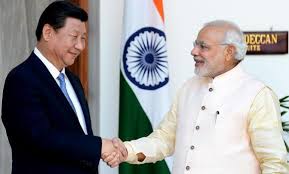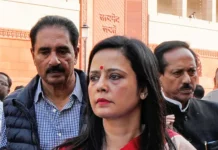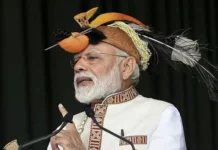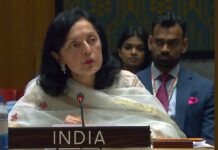 BEIJING: India and China have vowed to seek a “political” solution to the boundary issue and proactively resolve it as early as possible amid Prime Minister Narendra Modi’s emphasis that the dispute should not prevent progress in ties which have been “complex” in the recent decades.
BEIJING: India and China have vowed to seek a “political” solution to the boundary issue and proactively resolve it as early as possible amid Prime Minister Narendra Modi’s emphasis that the dispute should not prevent progress in ties which have been “complex” in the recent decades.
Modi asked China to “reconsider” its approach on some matters, like visa policy towards residents of Arunachal Pradesh, as he asserted that the two nations have a “historic responsibility” to turn the relationship into “a source of strength for each other and a force of good for the world.”
During their wide-ranging talks here, Modi and his Chinese counterpart Li Keqiang decided to increase the number of border meeting points of their military personnel from the existing four as they underlined that maintenance of peace and tranquility on the border was an “important guarantor” for the development and continued growth of ties.
Modi, while making clear that there was “no question of going back”, asserted that “standing still was not an option” and “moving forward is the only way out” in the relationship that has been “complex” in the last few decades.
The Indian leader sought tangible progress on issues relating to visa, an apparent reference to stapled visas issued by China to residents of Arunachal Pradesh, as he underlined that the two countries need to be “sensitive to each other’s interests”.
He stressed the need for strengthening mutual trust and confidence while seeking solutions to outstanding issues.
The two sides signed a record 24 agreements covering railways, mining, outer space, earthquake science and engineering, tourism, sister-cities and establishment of consulates in Chengdu and Chennai.
“The two sides affirmed that an early settlement of the boundary question serves the basic interests of the two countries and should be pursued as a strategic objective by the two governments.
“Bearing in mind the overall bilateral relations and the long-term interests of the two peoples, the two sides are determined to actively seek a political settlement of the boundary question,” said a Joint Statement after the meeting.
It added that the “two sides will resolve outstanding differences, including the boundary question, in a proactive manner. Those differences should not be allowed to come in the way of continued development of bilateral relations.”
“Our conversations were candid, constructive and friendly. We covered all issues, including those that trouble smooth development of our relations,” Modi said at a joint media interaction with Li after their 90-minute talks.
“I stressed the need for China to reconsider its approach on some of the issues that hold us back from realizing full potential of our partnership. I suggested that China should take a strategic and long term view of our relations,” he said.
The statement comes a day after Modi raised concern with Chinese President Xi Jinping over China’s USD 46 billion proposed investment in Pakistan-occupied Kashmir.
“I found the Chinese leadership responsive,” Modi said, adding that the re-emergence of India and China and their relationship will have a profound impact on the two countries and the course of this century.
Li said, “We do not deny that there are some disagreements between us but there is a mechanism and sufficient political maturity to address them.”
He said the two countries need to uphold peace and tranquility. “We stand ready to work with India to bring China-India relations to new heights,” he said, adding both the countries need to seize the opportunities to play a bigger role in Asia and beyond.
On the boundary question, Modi said the two sides agreed to continue to explore a fair, reasonable and mutually acceptable resolution.
“We both reiterated our strong commitment to make all efforts to maintain peace and tranquility in the border region,” he said.
The Joint Statement said the two leaders made a “positive assessment of the important progress” made through the mechanism of the Special Representatives.
They “reaffirmed the commitment to abide by the three-stage process for the settlement of the boundary question, and continuously push forward negotiation on the framework for a boundary settlement based on the outcomes and common understanding achieved so far, in an effort to seek a fair, reasonable and mutually-acceptable solution as early as possible.”
Briefing media on the discussions, Foreign Secretary S Jaishankar said Modi asserted at the meeting that the two countries seriously need to work on issues and build a higher level of trust.
“The Prime Minister said there is no question of going back. But standing still also is not an option. Moving forward is the only way,” he said.
Li said the two countries have been seen as “adversaries and competitors” in the past but the relationship was “poised at an important juncture”, Jaishankar said.
Quoting the Chinese Premier, Jaishankar said the two countries have “issues” but “that should not mean that we neglect the opportunities we have.” The Joint Statement said the two sides acknowledged the positive role of the Agreements and Protocols that have been signed so far in maintaining peace and tranquility in the border areas.
“Committed to enhance border defense cooperation, the two sides will carry out annual visits and exchanges between the two Military Headquarters and neighboring military commands, endeavor to operationalize the hotline between the two Military Headquarters, expand the exchanges between the border commanders, and establish border personnel meeting points at all sectors of the India-China border areas,” it added.
On the economic front, Modi raised concern over the expanding trade imbalance in favor of China after which the two sides decided to set up a high level task force to address it and other issues, like access.
“President Xi and Premier Li were very receptive to the specific concerns I had raised on our growing trade deficit.
We look forward to early impact on the ground,” Modi said.
“We have agreed to create a high-level task force to develop a strategic road-map to expand economic relations. It will cover a broad range of areas including Infrastructure, IT, Pharma, Agriculture and Manufacturing,” he added.
The trade imbalance has touched USD 38 billion, which is a major concern for India.
“The two sides resolved to take joint measures to alleviate the skewed bilateral trade so as to realize its sustainability,” the Joint Statement said.
“Such measures will include cooperation on pharmaceutical supervision including registration, speedier phytosanitary negotiations on agro-products for two-way trade, stronger links between Indian IT companies and Chinese enterprises, and increasing services trade in tourism, films, healthcare, IT and logistics,” it added.
“Both sides will make full use of the India-China Joint Economic Group to work on this,” it said, adding the leaders welcomed the decision to expedite discussion and endeavor to favorably address, in the spirit of mutual cooperation and reciprocity, the issues pertaining to tariff reduction in respect of relevant Indian products under the framework of Asia-Pacific Trade Agreement.
The two sides also decided to have a special mechanism to discuss issues related to WTO talks as both have the same approach on these.
Modi and Li also shared concern over terrorism and agreed on the need for closer cooperation to combat it.
“Terrorism is a shared threat. Instability in West Asia matters to both of us. Peace and progress in Afghanistan benefits us both. I am confident that our international partnership will deepen,” the Indian Prime Minister said.
The two countries reiterated their strong condemnation of and resolute opposition to terrorism in all its forms and manifestations and committed themselves to cooperate on counter-terrorism.
The Joint Statement said the two sides agreed that there is no justification for terrorism and urged all countries and entities to work sincerely to disrupt terrorist networks and their financing, and stop cross-border movement of terrorists.
They also called for early conclusion of negotiations on the Comprehensive Convention on International Terrorism.
India and China support a comprehensive reform of the United Nations, including recognizing the imperative of increased participation of developing countries in UN’s affairs and governance structures, so as to bring more effectiveness to the UN, the statement said.
China attaches great importance to India’s status in international affairs as a large developing country, and understands and supports India’s aspiration to play a greater role in the United Nations including in the Security Council, it added.–PTI






